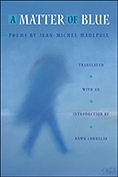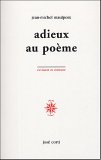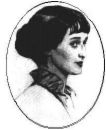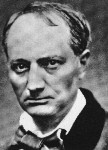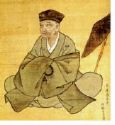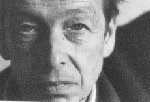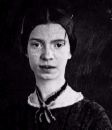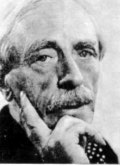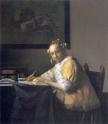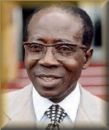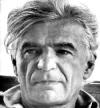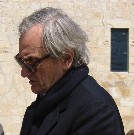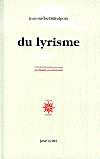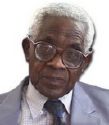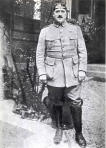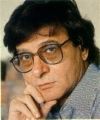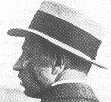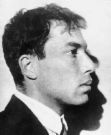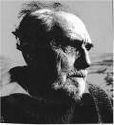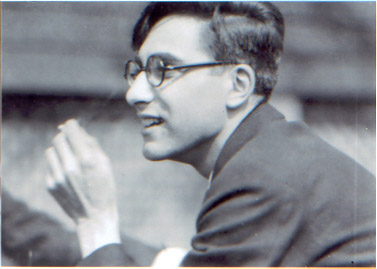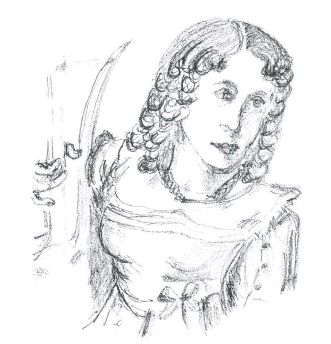Poetry is not well loved by criticism.
It constitutes an object of study that is difficult to discern,
in constant mutation throughout history, and free from the hold of
theory. Although it gives
rise to those clean slices of language called poems, so solidly
established in their own form that not a single word can be changed,
it seems that it always refuses to fence itself in.
So much so that to speak of poetry often leads to inappropriate
discussion: too technical or too subjective.
The theoretician wanting to construct a rigorous system must
resign himself to a distressing loss of critical efficacy.
How could it suffice
to describe poetry using formulas found in manuals, such as
“nature’s song”, “celebration of gods”, “expression of
personal feelings”, or “disorder of language”?
These are stereotypes that stifle the real stakes of writing.
Without being completely deprived of sense, they neglect the
singularities. This is
where the undefined finds refuge.
In discussion, poetry becomes dissolved in generalities, rather
than placed at the center of a crucial reflection on language.
“Poetic
Dictionaries” hardly offer anything but tools to facilitate the
observation of forms, without approaching the question of meaning…
In many regards, poetry remains criticism’s orphan.
It is rather in the work of poets, either in the margins or at
the heart of their poems, that we find the clues: In Victor Hugo’s
prefaces, Rimbaud’s letters, Mallarmé’s Divagations, Valéry’s
Cahiers, Rilke’s Correspondance or Elégies,
etc…
There does not exist,
to my knowledge, any serious study of critical discourse on poetry.
Its history, so to speak, has not yet been written.
The latter would, however, hold some strange surprises.
It would verify just how much commentaries oscillate between
subjectivism, mysticism, spontaneity, and formalism; but it would also
uncover that poetry gives rise to as much vague discourse as it does
to trenchant bias. Throughout
modernity, it seems that the gap has not ceased to grow between the
rigor of analysis conducted by the poets themselves and the rough
character of the remarks belonging to the university tradition or to
critics. Is there any
other art whose history has been marked by such quarrels, ruptures,
and proclamations, only to be turned against itself?
In its own intense trial, poetry must ceaselessly account for,
justify, and redefine itself.
The fulminations of Charles Baudelaire or Arthur Rimbaud
against Alfred de Musset, René Char’s raging remarks against the
“lazy”, Francis Ponge’s vindication of elegiac lyricism,
Yves Bonnefoy
’s suspicion of the image, and Philippe Jaccottet’s radical
questioning of poetic deception are all examples verifying that poetry
is a hostile terrain, a battlefield of language and its stakes…
This intellectual
intransigence is the act of poets reaffirming much more than their
aesthetic biases: it is their very raison d’être that is
concerned. Because they
interfere with language. Because
there they tie the subjective and the objective.
Because they run the risk of lying and illusion.
Because they often cause the inanimate and the dead to speak.
Because they turn toward something else over which
reason has no hold. Because
they allow themselves to be guided by the flesh and write without any
control other than their own vigilance…
Once these stakes are
recognized and fully illuminated by the modern era, it is not
surprising that poetry strips itself of every definition… Its
purpose does not exist outside the very work that it accomplishes; it
is a moving target that each poem locates in its own way, yet never
attains. No one can claim
to define poetry, if in a strict sense this consists of extracting its
essence, and thus to say what its necessary conditions must be.
The principle of poetic writing is to always go beyond: to
“burn the enclosure”, in the words of René Char.
And yet it is also
the task of poetry to work endlessly to define itself, to
redefine itself. As
Michel Deguy
wrote: “poetry’s restlessness over its essence inhabits poetry
since its Greek beginning.” Strangely,
poetry is the blind and the restless attempt of language
to learn more about what it is doing and what is playing inside
it. Through its formal
propositions, poetry simultaneously puts language into play and its
own existence into question.
It is certainly one
of the distinctive traits of modernity to have released poetry
from exterior motivations, such as “the moral” and “the
lesson”, causing it to increasingly take care of its own self: to
observe itself, to scrutinize itself, to describe itself… Abandoning
the marks of its past, modern poets have put poetry outside itself,
outside of verse for example, even outside the poem.
Removing it from the good and the beautiful, they have turned
it against “poeticism”. They
have made it throw away its riches.
They have stripped it, simplified it, and flattened it to the
extreme.
By wanting to isolate
its uniqueness in order to better understand itself, modern poetry has
exasperated its own critical dimension.
More “problematic” than ever, it has engaged the trial of
its own excess, even harshly questioning some of its oldest
attributes: the image, the sentiment, the hope, the celebration…
Some of our most lucid contemporaries have tried to show that poetry
could be entirely different by distorting its ordinary excesses
and dreams without sacrificing any of its relation to the
inexpressible, possibly to the extent of reinforcing poetry through
the implacable work of stripping the word.
One could also say
that the modern poet never finishes, or that he will continue
to force himself to finish: in turning poetry against itself, he tests
its resistance.
As
Michel Deguy
again once wrote: “Poetry is suspended; today it questions itself
from within itself.” Thus
throughout modernity, a mounting tension of philosophical questioning
can be found within poetry: the poet questions its sense and purpose
in the very poem that at times only exists through these questions.
An example is presented here from an excerpt from Philippe
Jaccottet’s WinterLight:
It’s
easy to talk, and writing words on the page
doesn’t
involve much risk as a general rule:
You
might as well be knitting late at night
in
a warm room, in a soft, treacherous light.
The
words are all written in the same ink,
‘flower’
and ‘fear’ are nearly the same for example,
and
I could scrawl ‘blood’ the length of the page
without
splashing the paper or hurting
myself
at all.[1]
The spoken reflections of modern poetry do not mean that it has
become speculative (which it was during the classical and Romantic
periods), but that it is more and more specular : it acts
like an optical instrument that favors the internal reflexivity
of language. To carry out
the « cleaning of the verbal situation » : Paul Valéry’s
famous formula summarizes this demand fairly well.
Whereas philosophy defines concepts, poetry fragments language
into objects which renew our understanding of the real, the subject,
and language.
The most obvious reason for the existence of poetry is the
simple fact that we are creatures who speak.
Unlike animals, we hold on to the edge of the world by this
human word that defines our being.
We are linked and separated, simultaneously immersed in
language and confronting it, as curious about what exists as we are
troubled by what does not exist. Because
we are speaking creatures pierced by care and desire, a place is
created inside us for these strange notions of the ideal, the
absolute, the impossible or the eternal…
Poetry exists because articulated language inscribes in us much
more than what we can say, or because words are not a simple currency,
but instead carry us beyond what we can think or grasp.
It is the preeminent place where our dissatisfaction and
contradictions are articulated. Poetry
traces our lines of passage from poem to poem and makes our clumsy and
thwarted walk understandable. It
constantly confronts opposing notions, such as real and ideal, cut and
link, advance and retreat, search and find, even finding its
force in their contradiction. The
poem is the stage where the drama of expression unique to human
creatures is realized. It
is here that language is seen struggling.
It is here that the effort of the human creature to find itself
in its own unknown is understood.
Recall, for example, the strange opening of Paul Valéry’s
La Jeune Parque
(The Young Fate) :
Is
that the simple wind? If
not, who’s crying
There
at this hour alone with furthest diamond?
Who’s
there, so near me at the point of crying?
Far from attaching myself here to an
improbable definition of poetry, I have chosen to describe it
grappling with the contradictory forces that it puts into play.
Describing what I could call its actions and gestures
while observing some of these pairs of notions that insistently
reappear under the poets’ pen. This
will be my way, unavoidably limited, of responding to the question, What
about poetry?
In the limited time of this conference, I will only deal with
three pairs of conflicting and interdependent motifs, presented in the
following order: advancing / retreating, searching / finding, cutting
/ linking.
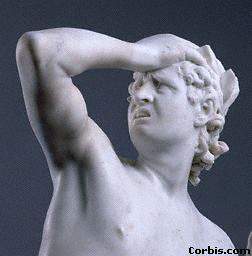
1.Advancing
/ Retreating
Anyone who opens a
poetry anthology will unavoidably be confronted by two apparently
antagonistic motifs : forward and backward.
On the one hand a celebration of awakening, of departure and
moving forward, looking ahead to the future.
On the other, a melancholy twilight, oriented toward the
recollection of the past. At
times narrowly combined (as in Victor Hugo’s famous poem « Demain
dès l’aube » [“Tomorrow at Dawn”]), these two motifs have
a strong structural value: they inform us of the stakes of the lyrical
experience.
These two motifs have
been present since the myth of Orpheus, which Western poetry
repeatedly returns to and stylizes, recognizing in it something like
the tale of its origins.
After losing Eurydice
to the bite of a serpent, Orpheus courageously descends to the
Underworld in the hope of bringing her back.
He charms the ferryman with his song, softens the three Judges
of the Dead, suspends the punishment of the damned, and finally
obtains permission from Hades to bring his wife back among the living.
To this Hades imposes one condition: that Orpheus does not look
back until Eurydice has returned under the light of the sun.
Due to guilty impatience, Orpheus does not keep his promise:
seeing the light of day, he looks back to assure himself that his
companion is following him and loses her forever.
From here on begins his painful wandering, turning him into a
tearful singer capable of entertaining the mute lives of trees and
wild animals…
As the myth explains,
the song of love arises from loss: In order to bring back to light the
lost Object, poetry goes among the shadows and negotiates with them.
It will possibly charm them and come close to defeating them or
convincing them… It does not descend to the underworld out of spirit
of conquest, but rather out of love, to try to save love…
Poetry has its origin
in a look behind toward death. Orpheus’
« wandering voice » supports itself against the void.
It belongs to the first great « failure » that
founded the lyrical. Wrung
like a thyrse, Orpheus is both memory and prophecy: he creates from a
loss. The inconsolable
widower is also a civilizer : a legislator, a philosopher, and an
inventor of alphabet, music, and poetry at the same time.
As the first figure of elegiac reflexivity, he transforms his
fatal loneliness and hopelessness into offerings for the community of
men. He thus turns loss
into gift. Already in the
Underworld, his pain and his song were able to move irresolute
shadows: a fleeting community was able to construct itself around his
pain. He turns separation
into reconciliation. He regroups
what is disjointed. He
brings back what is lost. His
legend tells a story of words and creatures who flow around a
song. His biological
father was a river-god.
Like Orpheus, the poet at first appears as a man who looks
back, Orpheus toward Eurydice, Villon towards “les neiges
d’antan” (“the snows of yesteryear”), Du Bellay towards his
little Liré, Lamartine towards the voice of Elvira, Baudelaire
towards “le vert paradis des amours enfantines” (“the green
paradise of childhood loves”), Rimbaud searching for “la petite
morte derrière les rosiers” (“the little dead girl behind the
rose bush”), Apollinaire on the Rhine, seeing the cherry trees
“that froze behind” losing their flowers in “May”, or again
exclaiming, “Je me retournerai souvent” (“I will turn back
often”)… Such is the
diligent declination of an ubi sunt that feeds the elegiac
dimension of writing: “Where are our lovers?”, “What have our
friends become?”… Poetry
says “I remember” as well as “Nevermore”…
What
does the poet see, what does he show in turning back?
That which was formerly united: a conjunction, a conjuncture.
He turns back toward unity, as well as toward places or toward
a time. Turning back
unites space and time. It
is a work of memory. This
is how the poet proves himself to be, according to Mallarmé’s
formula, “le Montreur des choses passées” (“the Projector of
things past”), the one who makes Time visible.
His gaze falls on that which is no more, as well as on that
which is destined to fade away.
For Nietzsche, this
turning back is also a way to alleviate life:
“Insofar as they
want to alleviate the life of men, poets either turn their eyes away
from the toilsome present or they procure for the present new colours
through a light which they direct upon it from the past.
To be able to do this, they themselves have to be in many
respects backward-looking creatures: so that they can be employed as
the bridges to quite distant ages and conceptions, to dead or dying
religions and cultures.”[3]
These epochs, these
“quite distant conceptions” which Nietzsche speaks of, is what
Pascal Quignard calls le jadis, the time past.
He points out that the oldest human figurations are
retrospections.
“Un présent intense est du jadis vivant” (“An intense present
is alive because of time past”), he writes.
The founding act of
poetry is certainly nostalgia. Nostalgia
for the recent past, nostalgia for the lost, for the origin, for the
impossible. “Nostalgia,”
comes from the Greek word nostos, which means “return.”
As Quignard writes, “le nostos est le fond de l’âme.
La maladie du retour impossible du perdu – la nostalgia –
est le premier vice de la pensée, à côté de l’appétence au
langage” (“nostos is the foundation of the soul.
The despair arising from the impossible return of what has been
lost – nostalgia – is the primary vice of thought, aside from the
appetence for language”).
These are very old links that in poetry constantly come undone
and then tie themselves back up: the
love song of the mother, a lullaby whose words require breath
and flesh, warmth of discourse and lyricism…
It is up to poetry, through its music as well as through its
images, to reunite us again with that which has disappeared.
The poet is not
content with evoking the past, watching over it, or commemorating it
with nostalgia. He works
it like a living substance, a precious material, mental and verbal:
he reawakens its lost shine, he designs the stage within it, he
brings it toward the present, to presence.
This past is the
originator, the founder, which is to say the obscure foundation of the
subject’s existence, as well as culture’s buried memory.
Like the Prince’s kiss, writing reveals a happy memory as
well as language’s dormant past, dissimulated, for instance, in the
etymology of words, the syntactical rule, or in the myths and symbols
to which the images correspond…
But if the past is
the originator, then turning back is also starting anew.
Repeating the way in which chaos became tied to the world.
It is reproducing the genesis of the person and his desire, as
well as of the still imaginary world in which we live.
And it is revisiting the poem’s reason.
Pursuing the indefinite search within it.
“Searching” will thus be my second motif…
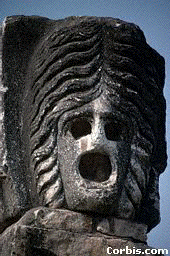
2.
Searching /
Finding
During the Middle Ages, the poet was called a troubadour or
trouvère, which means finder. The
Romantics also made him into a chosen one, an inspired one who
received from nature or dreams the same happily “found” words
formerly dispensed to him by the Muses.
To surprise and take aback as Baudelaire wished to do, to
explore the unknown like Rimbaud, “to leave room for the lucky
find” (“laisser la place à la trouvaille”) as Apollinaire
claimed, are all motifs that place poetry near the don gratuit,
a singular phenomenon of understanding and reception, without a
specific cause. The luck
of the find, applying this time to the exterior world, constitutes one
of poetry’s favorite subjects: whether it speaks of nature’s
awakening, of the sudden appearance of a beloved figure, or of the
“found objects” (“objects trouvé”) dear to the Surrealists,
poetry privileges the unexpected meeting points, the instants where
life’s ordinary trajectories are suddenly crossed by a miracle.
But if the poet is
the finder, he is also the seeker.
Curiously, one of the often-proposed etymologies of the word
“rhyme” associates it not only to rhythm but also to the
Latin verb “rimare” which means “to search for, to examine with
care”.
“He goes, he runs, he seeks.
What does he seek?” wrote Baudelaire when discussing “the
painter of modern life.” What
does poetry look for if not, as Henri Michaux, to “approach the
problem of being”? In
asking questions less concerned with being than with identity and
circumstance: “Where are we?” “When are we?”
Such as Baudelaire questioning “the stranger”, Rilke asking
in his fifth Eulogy: “Où donc, où est le lieu?” (“Where
then, where is the place?”) or Verlaine engaging the soul and heart
in dialogue in the seventh “forgotten Ariette” of Romances
without words:
Mon âme dit à
mon Coeur: Sais-je
Moi-même que nous
veut ce piège
D’être presents bien qu’exilés
Encore que loin en
allés?
(My soul says to my heart: Do I know
What this trap wants
from us
To be present and exiled,
As well as long
gone?)
Less
sing-song than interrogative, less inspired than questioning, modern
poetry is a weaving of words in perplexity.
Through the precision of its tricks, it cracks open language
onto our ignorance. The
poet is the one who declares from the very heart of language that the
world is uncontrollable. The
one who reopens (in its depth) the space that we considered closed.
The one who invites us to continue on our path.
The one who enjoins us to exist, quite simply.
“Que reste-t-il? Sinon
cette façon de poser la question qui se nomme la poésie” (“What
else is there? If not this
way to ask questions called poetry”) writes Philippe Jaccottet in Elements
of a dream. He
illustrates this motif in a new way in a text in Winter’s Light entitled
“Autres chants”:
Cherchons plutôt
hors de portée, ou par je ne sais quel geste,
quel bond ou quel
oubli qui ne s’appelle plus
ni “chercher”, ni
“trouver”
(Let us rather search out of our reach, or through some
gesture,
some leap or some
forgetfulness no longer called
“to seek”, nor
“to find”)
Thus
modernity allows us to witness a radical turning back: the inspired
former protégé of the gods has become a perplexed being who guards
the question: the one who takes care of the gods’ absence.
In
one of these essays, Heidegger affirms, “To be a poet is to
calculate.”[7]
Poetry, as a matter of fact, is a metric language that measures
the sites of human “habitation between heaven and earth.”
There the creature measures what belongs to it and compares
itself to what exceeds it. It
looks toward the beings and the objects of the nearby world, as well
as toward the invisible distance or toward the azure peaks.
The poet’s job is to measure the in-between where the
path is familiar as well as perilous and where saying ordinary things
about life is as necessary as setting out for the extreme regions
where comprehension becomes lost.
The
poet’s peril would be to lose (good) sense and to lose himself in
the insensible. To find
himself, like Rimbaud, journeying through Hell, the victim of
madness… Because the
poet’s path is much different from that of the philosopher.
When the latter decides to retrace the limits of the human
condition, he first goes to work methodically unmasking illusions.
When he asks, “What can a man do?”, it is with a defiance
of the impossible. Poetry,
on the other hand, remains in contact with illusion, it is
written from what perturbs, inspires, mobilizes, and problematizes the
subject: sentiment, passion, sensation… Reason is not its master.
Poetry
seeks knowledge through inflammation.
It moves toward clarity, but remains faithful to the shadows.
Its purpose is not to point to a direction, nor to lay down
boundaries, but rather to know the unsteadiness of our origins.
It
definitely seems to me that the play of seeking is none other than the
raison d’être. In
its ultimate aim, regardless of its pretext, its point of departure
more or less circumstantial, poetry sets out to reevaluate our reasons
for being in life (in the living experience).
Keeping the real and the ideal vis-à-vis one another, in
confronting on the axis of time what is, what has been, and what may
be, in summing the possible and the impossible, poetry values
and evaluates our reasons to live.
It falls on the side of value.
Or it leans toward value.
To
make life a bit less absurd, here is what one can ask of the poet.
Do not embellish artificially, do not fool us from the truth of
things, but rather show us what we are made of and how it plays into
our actual dreams and desires. Explain
to us in a word, from the view of the passer-by, the conditions of
hope and love. Tell us
when to live and when to die. Prevent
us from losing and sacrificing ourselves to what devours us.
One should expect nothing less from the poet than the entire,
naked truth, not abstract or general but concrete and radical, and
above all such that we can find within it new reasons for living.
It
is up to the poet to establish a space for our complaints and praises:
to derive language from value and sentiment.
It
is up to the poet to institute the meter’s resistance tonumbers, the
measurement’s resistance to speculation, and the human word’s
resistance to the noise of technique and trade.
It
is up to the poet to show a certain standard (another form of
resistance) in what exists as well as of what exists:
cohesion and coherence, finally, of a being and of a milieu sustained
by its speech.
It
is up to the poet to show the links, because through history man has
done nothing but create distance and separation.
This
motif will constitute the last part of my presentation…
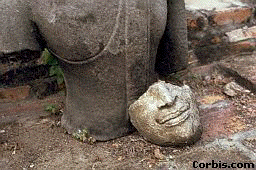
3.Cutting /
Linking
Since
the nineteenth century, poetry has not ceased to accentuate the
effects of cutting.
Christian Prigent
’s title Ecrit au couteau
is in many ways emblematic of the modern poetic gesture where critical
conscience and separation overtake the inspired and singing word.
Cutting, rather than sewing, will define modernity:
Le
fragment, il faut le faire. Casser,
fracturer, fragiliser, tracer l’arête: affaire de décision
tranchante de coupures: écrire..
(The
fragment should be made. To
break, to fracture, to make fragile, to trace the line: the work of
cutting decisions: writing.)
Present
in Orpheline’s severed head since the original fable of Western
poetry, the cut is truly inherent in all written poetry.
It directs the syncopated rhythm of poetry.
Poems are neatly cut language objects that could be said to create
imagery on the page because they start with the eye.
Unlike the novelist, the poet works with “frequent stops”:
he should endlessly renew the beginnings of language and establish new
links to the origins.
Poetry is a
fragmented language that cuts prose with the interruption, the
segmentation of verses that are like so many more of less broken
segments or phrases carried away into a “turn”.
Using heterogeneity, juxtaposition, anacoluthon, and all sorts
of short circuits, poetry fights rhetoric and manages to electrify
language. It takes up the
scissors and hollows out or exposes hollows, bumps, and lines of force
within its figures.
Made of outbursts,
surprises, and intensities, poetic experience imposes a violent
scanning on existence, one that is punctured by anger and falls.
It sums up moments, focuses attention on encountered objects,
and takes “existing” over fact.
Its epiphanies resemble flagrant offenses.
It spaces out and fractures the repetitive unity of common
life. This is how it
designs what
Christian Prigent
calls “a place of indecision, a space marked by the indetermination
of the senses, to show this place (and to affirm that this place is
specifically human)”[10]
Poetry results from
the knowledge (however deaf, confused, or obscure…) that man has of
his broken nature. Accordingly,
it drives language up to its point of rupture.
It knocks into silence, or stands out in it.
Quite close to silencing itself.
Threatened in delirium to make its last “squeak”: “I
don’t know how to speak anymore” exclaimed Arthur Rimbaud.
Perhaps the most
touching poems are the ones where a voice on the verge of breaking is
heard. A language breaking
or composed of breaks: “My glass was shattered in a burst of
laughter” (“Mon verre brisé dans un éclat de rire”) wrote
Apollinaire.
However, as segmented as it may be, poetry is still the work of
spinning. The poet is
really a rival of the three Fates of antique mythology: He spins out
destiny in language, he measures it and cuts it.
Like Penelope, he ceaselessly weaves and unweaves his fabric…
The capacity to
discern, establish, multiply, and reveal connections lies at the heart
of poetic creation. Images
arise from these connections. This
is how Pierre Reverdy defined the poet’s aptitude:
Sa faculté
majeure est de discerner, dans les choses, des rapports justes mais
non évidents qui, dans un rapprochement violent, seront susceptibles
de produire, par un accord imprévu, une émotion que le spectacles
des choses elles-mêmes serait incapable de nous donner.[11]
(His main ability is
to discern, in things, connections
that are true but not obvious, that in a violent conjunction would be
likely to produce, through an unseen agreement, an emotion that the
spectacles of the things themselves would be incapable of giving us.)
He talks about
producing a second emotion, about aesthetic nature, the sense of
connection itself, and nature’s renewed vision as well as its
unexpected extension: in this new phrasing, the real appears
both larger and narrower, more extended and more coherent.
It’s an answer to the wear and tear of daily life: to the
monotony of repetition, to the servitude of fatality.
More narrowly than
any other literary object, the poem hatches its motifs at the mercy of
sound and sense, in woven metaphors, assonances, alliterations, at the
mercy of interruptions and repetitions that cause the turning of
verse. In doing so, it
weaves onto the page a kind of dark cloth, similar to a spider’s
web, whose holes and blanks are as important as the lines.
A number of unforeseen travelers are caught in this fabric of
verses strangely knit together, much like in the trap woven by an
insect: for the things of the world, the poem’s fabric is a threat,
as much as it is a final resting place…
To define his work,
the poet
Jacques Dupin
, in Échancré, uses the metaphor of the silkworm.
Writing is “a work of manducation and insatiable
metamorphosis that operates and can only be accomplished in solitude,
obscurity, silence (…).” In
silk verse, as in words, he recognizes the capacity to corrode the
world “in order to give birth to an imponderable and turbulent
mouthful of thread”, this involuntary bulimia that leads to eating
the page in order to unwind the thread, to swallowing pieces of paper
just for “the sharpness of the line of silk”.
Writing consists of extracting from oneself a “muddle of
traces”, a “cloud of fibers” that defy the very reason that the
writer must undertake to follow, without submitting to the
“obsession of the catch”, in accepting to stay within the
undecidable. Of course,
the writer repeats the Fate’s ancient gesture on the page, but this
time he unwinds a flimsy thread whose extreme fragility he knows only
too well. Dedicated to
deprivation, to disappearance and to effacement, for a few pages he
rules over an absurd empire of waste: like the worm clinging to its
leaf, he fabricates a translucent beginning of beauty.
And if he occasionally writes in verse, it is because his life
is hanging on by this one thread.
His own face does not exist: he denies it, stamps on it, and
consumes it: it diffracts, becomes frayed and loses itself.
This is the modern type of “subject” that Roland Barthes
wrote about in “The Pleasure of the Text”, one that unwinds in
writing like “a spider that dissolves in the constitutive secretions
of its own web” (“une araignée qui se dissoudrait elle-même dans
les sécrétions constitutives de sa toile”).
As much as the
outside, its circumstances, its aims and its passer-bys, the darkest
and most intimate of subjects also become caught in the web.
In weaving and cutting language, the poet creates a rhythm
where his voice will be recognized, like a secret signature of his
identity.
Poetic writing works
from strange psychic stakes, open to the regressive as well as to the
future, renouncing links through its system of repetitions as well as
accentuating the expression of cuts.
In his “Apologie du
poète”,
Pierre Jean
Jouve compares it to a state of agglutination:
“La Poésie est
une penseé – un état psychique – d’agglutination; c’est-à-dire
que des tendances, des images, des échos de souvenir vague, des
nostalgise, des espérances, y apparaissent en même temps et comme
collés ensemble, provenant de hauteurs tout à fait différentes.”[12]
(“Poetry is a
thought – a psychic state – of agglutination: which means that
tendencies, images, echoes of vague memories, nostalgias, and hopes
belong to it simultaneously and as if they were stuck together, coming
from completely different heights.”)
The poetic combines
the distinct and the indistinct, determination (accentuation,
underlining, borders) with a prolonged hesitation.
It seems that poetry works to reestablish or establish
distinction from the very heart of the indistinct.
It recaptures the ipse in the idem, the singular
in the identical. But the
poet is above all the one that enters and moves about in the
indistinct, indeed the one that most directly confronts intimate
confusion: no clarity opens itself up for the poet without his
submitting to illusion first.
To write poetically consists of sewing the black threads
onto the white page, as well as unstitching with sense,
nonsense, the real, the fanciful…. And of forcing to mend our
holes, our separations, and our wounds.
Ceaselessly picking up and mending a seam that
comes undone. Repeating
indefinitely the act of our birth.
It is going back to the world as well as strengthening the tie
to the mother tongue. Forcing
itself to reenter, to return to itself.
Sometimes turning against itself: going and coming, midway
between birth and disappearance, in the in-between that is ours.
Writing is advancing
on a thread, a fine thread of voice, in the double ignorance of origin
and end. It is expressing
and questioning life between the two unknowns that border it.
It is naming with precision the present, such that it will
ignore what preceded it and what will follow.
It is well-known that
poets favor transitional places and moments: borders that
separate and link at the same time.
What borders, defines, but can also open onto the limitless,
like a beach. Poetry is a
border of language that faces overflow.
It sees our life bordered in black by death.
Life in the dark light of death, “dark drop” at the bottom
of the ink-well. To us it
is infinitely precious, and thus must be taken from us.
Window of day between two nights.
“Between earth and myself I find death”, wrote André Chénier.
If one day I should come upon a definition of poet or poetry,
it will be much like a mosaic: made of joined pieces, of different
colors and forms, but with touching sides.
And if I should assemble the fragmentary propositions that
constitute it around a central motif, it will certainly be the
question of our destiny.
Gladly, I will define
the poet as someone awakening in time, more attentive than anyone else
to what happens and changes, and curious to know what lies in the
passage of time, which for him is never an impure milieu, but a
sensible space where every form of life is precious and threatened.
In mobilizing all the resources of language, the poet brings
to life that which is absent: what does not exist, or what time
carries away, or is no more, or will never be.
If sadness prevails
in poems, if the pure expression of joy becomes a rarity, it is
because poetry seizes everything in the passage of time.
It has nothing to do with ideas or concepts.
For poetry, presence is all the more alive because it is
continually disappearing. A
poem is a bridge laid across time: all the reflections that can be
seen underneath it belong to its flow.
Poet: the one who cannot be consoled from dying by anything or
anyone, and the one who is led by his awareness of disappearance to
feverishly seize language in order to fix that which is disappearing,
as well as to speed à tombeau ouvert through the paths of
time.


